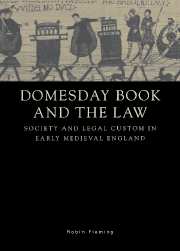Book contents
- Frontmatter
- Contents
- List of figures and tables
- Acknowledgments
- List of abbreviations
- Two brief notes on the texts and indexes
- Table of F numbers by county
- Frequency of legal information across counties and circuits
- Introduction
- Part I Domesday Book and the law
- Chapter 1 The inquest and the mechanics of justice
- Chapter 2 Living in the shadow of the law
- Chapter 3 Disputes and the Edwardian past
- Chapter 4 Disputes and the Norman present
- Part II The texts
- Part III Indexes
Chapter 4 - Disputes and the Norman present
Published online by Cambridge University Press: 14 January 2010
- Frontmatter
- Contents
- List of figures and tables
- Acknowledgments
- List of abbreviations
- Two brief notes on the texts and indexes
- Table of F numbers by county
- Frequency of legal information across counties and circuits
- Introduction
- Part I Domesday Book and the law
- Chapter 1 The inquest and the mechanics of justice
- Chapter 2 Living in the shadow of the law
- Chapter 3 Disputes and the Edwardian past
- Chapter 4 Disputes and the Norman present
- Part II The texts
- Part III Indexes
Summary
Disputes and the Norman settlement
Not all disputes aired in 1086 were the product of prelapsarian circumstance. Many of the inquest's conflicts were newly minted, and came into being in the first two decades of Norman settlement. Sometimes the claims brought forth in 1086 were between rightful TRW holders and successful predators: in these cases we can identify both saints and sinners. In the invasiones of Suffolk, for example, we are told that Richard fitz Gilbert, “the bad neighbor,” had taken a carucate of land in Bradley. Presumably Richard's local sobriquet, malus vicinus, was awarded because of his relentless encroachments. In Bedfordshire, William de Warenne not only dispossessed William Speke of some land in Dean, but he stole a couple of horses there from William Speke's men. And while Bertran de Verdun was in France on the King's business other lords settled near him took advantage of his absence: Geoffrey de Mandeville disseised him of half a hide, and Ralph Taillebois built a mill on Bertran's land. These and other of Domesday's most blatant annexations share two important characteristics. First, Domesday Book assigns unambiguously condemning words to these actions: “seized,” “annexed,” “encroached,” “stole,” or the like. Second, the actions found in association with these verbs are often concerned not with whole estates, but rather with pieces of them. Hundreds of small encroachments, involving the theft of a mill or the seizure of woodland and meadow, were the subject of litigation in 1086. Clearly, liminal and valuable possessions like these were common objects of desire, but without the evidence of Domesday we should never know it.
- Type
- Chapter
- Information
- Domesday Book and the LawSociety and Legal Custom in Early Medieval England, pp. 68 - 86Publisher: Cambridge University PressPrint publication year: 1998



